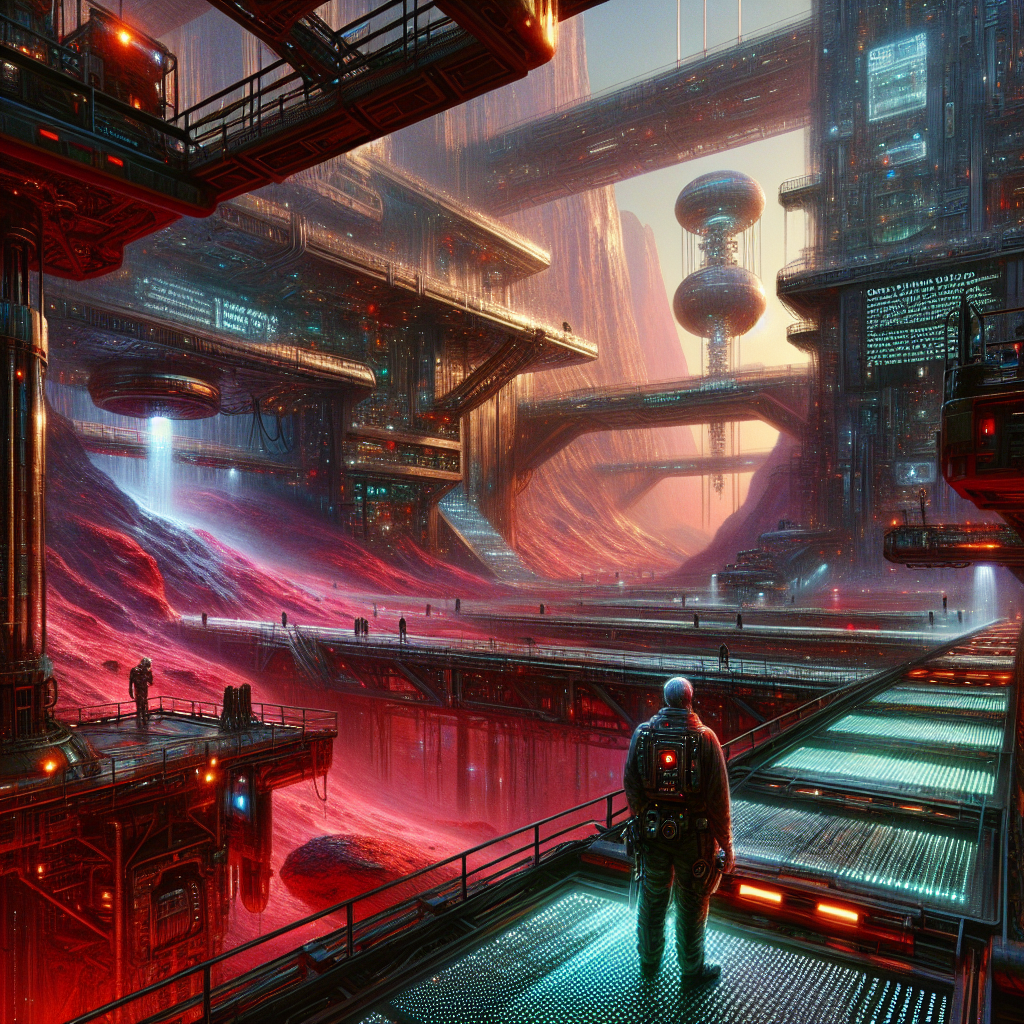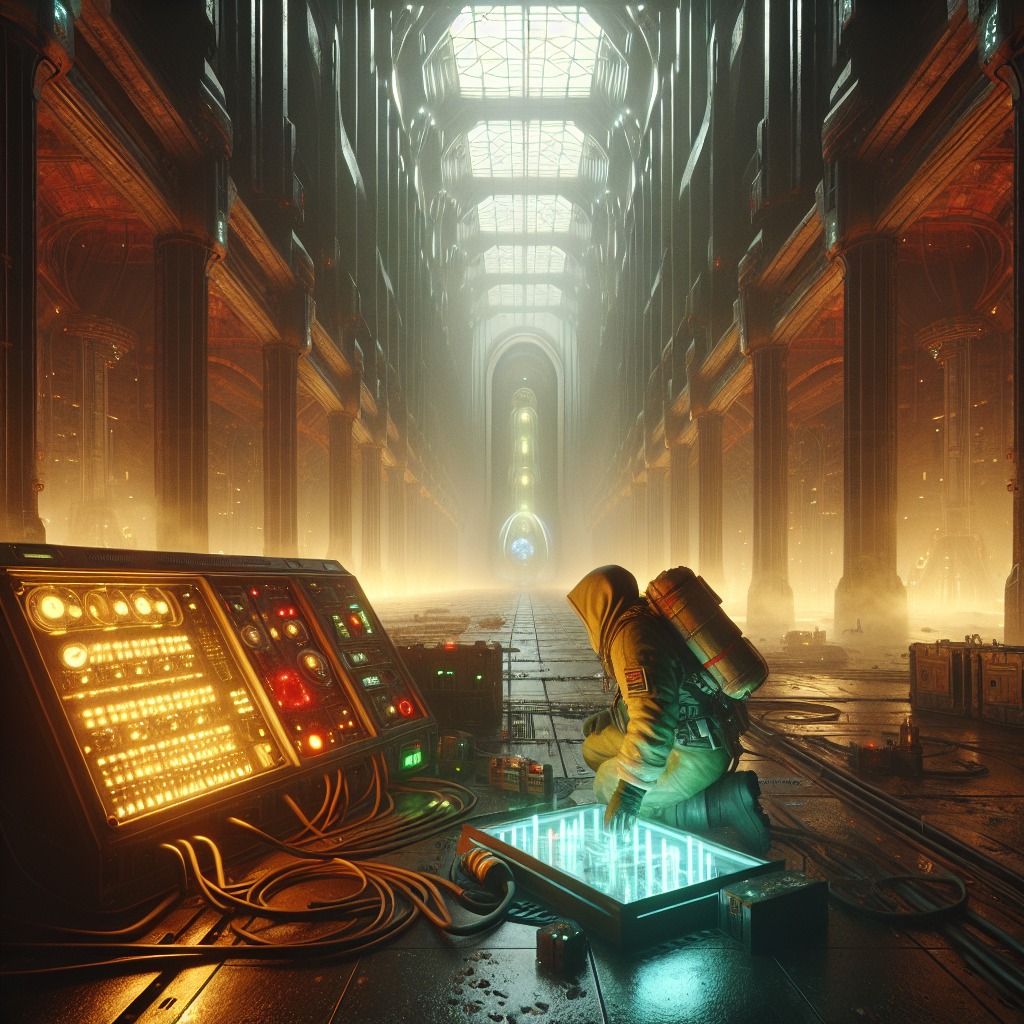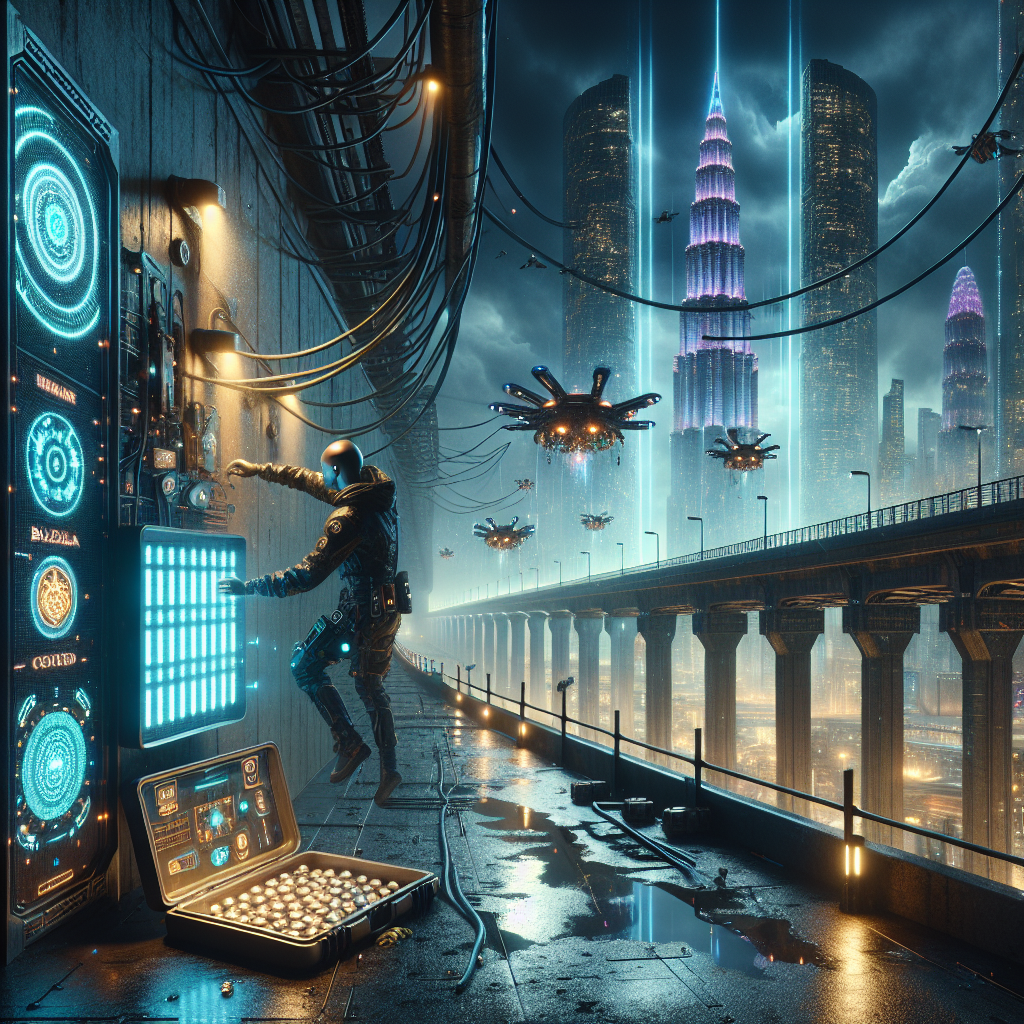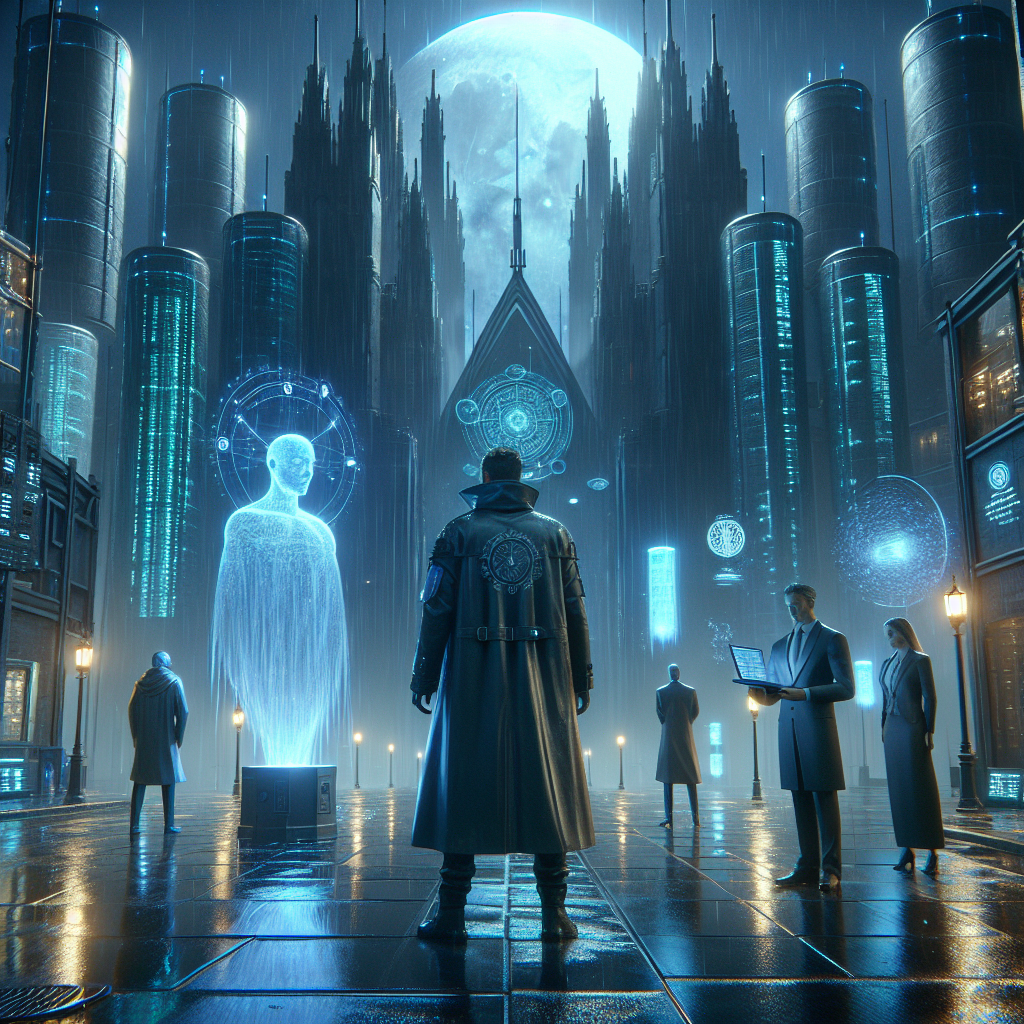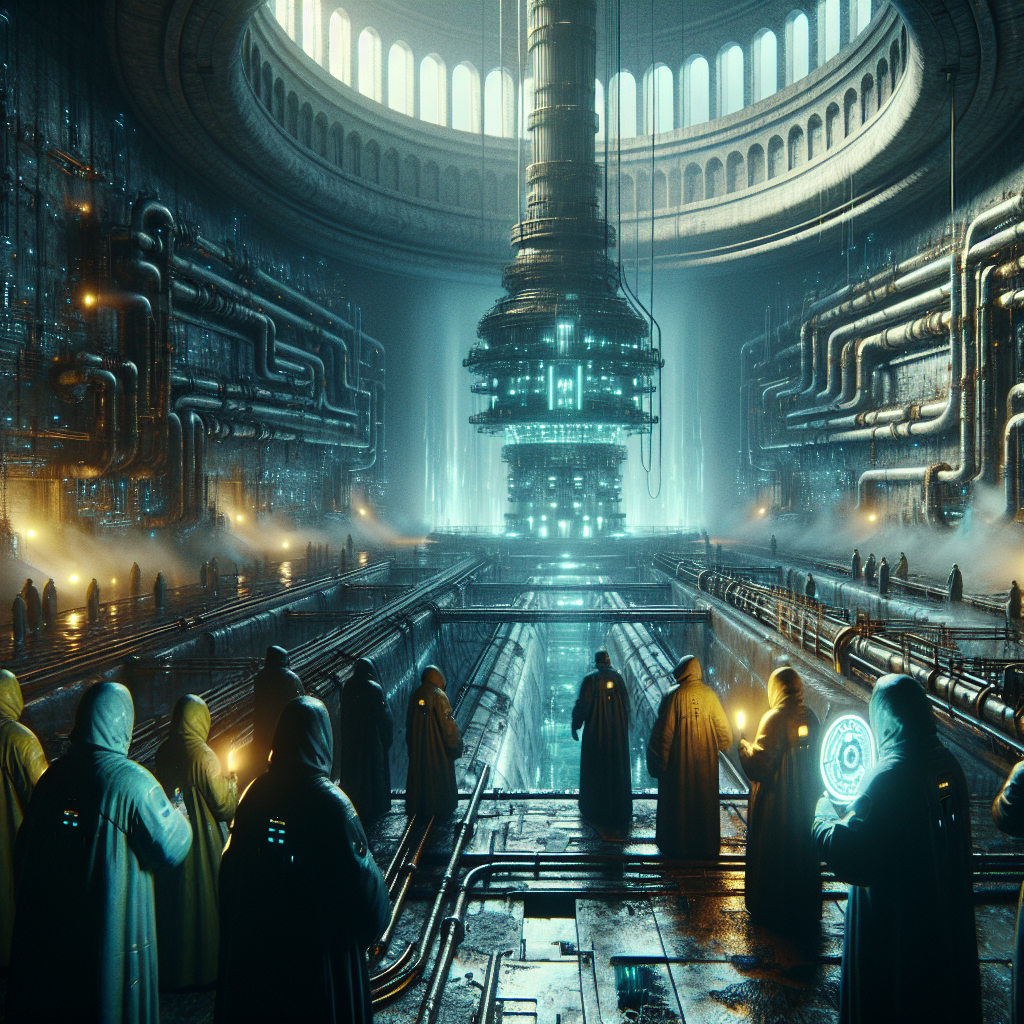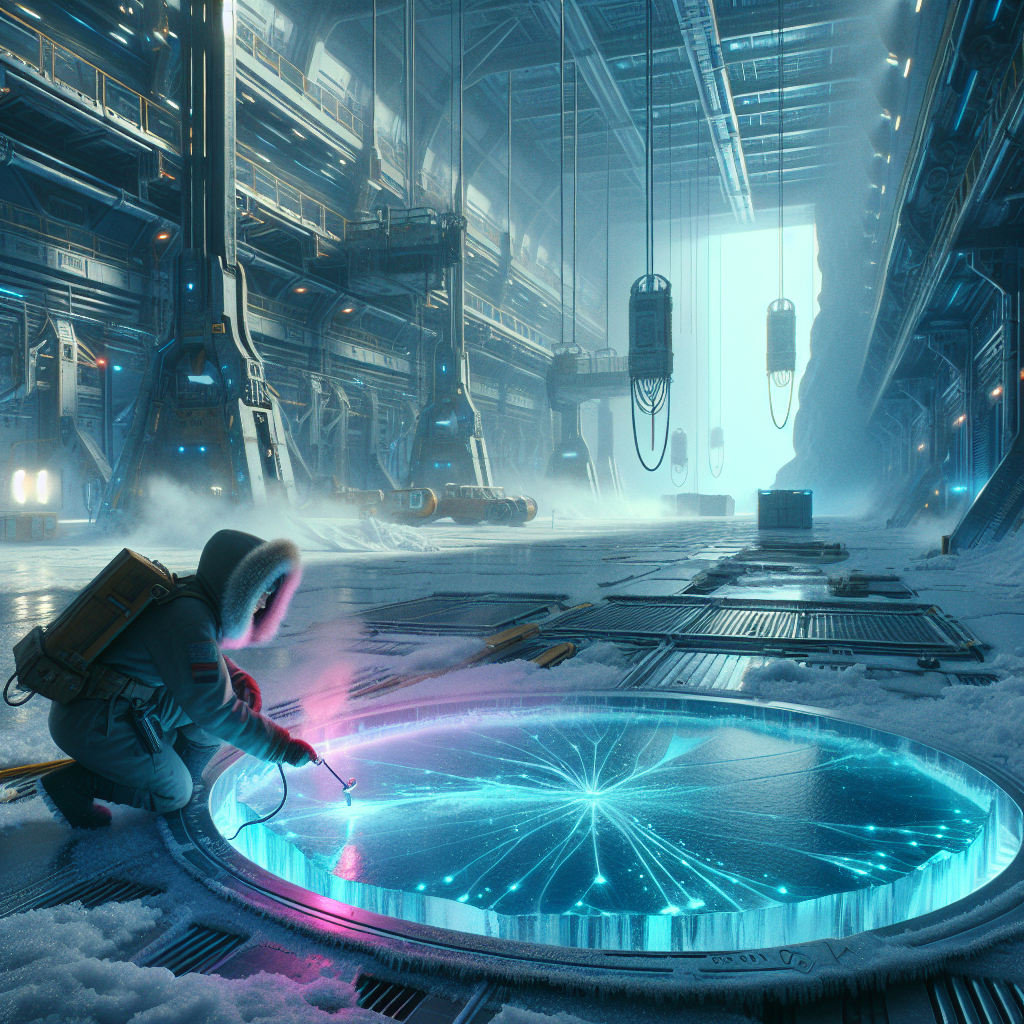Chapter 7 – The Rain We Signed For
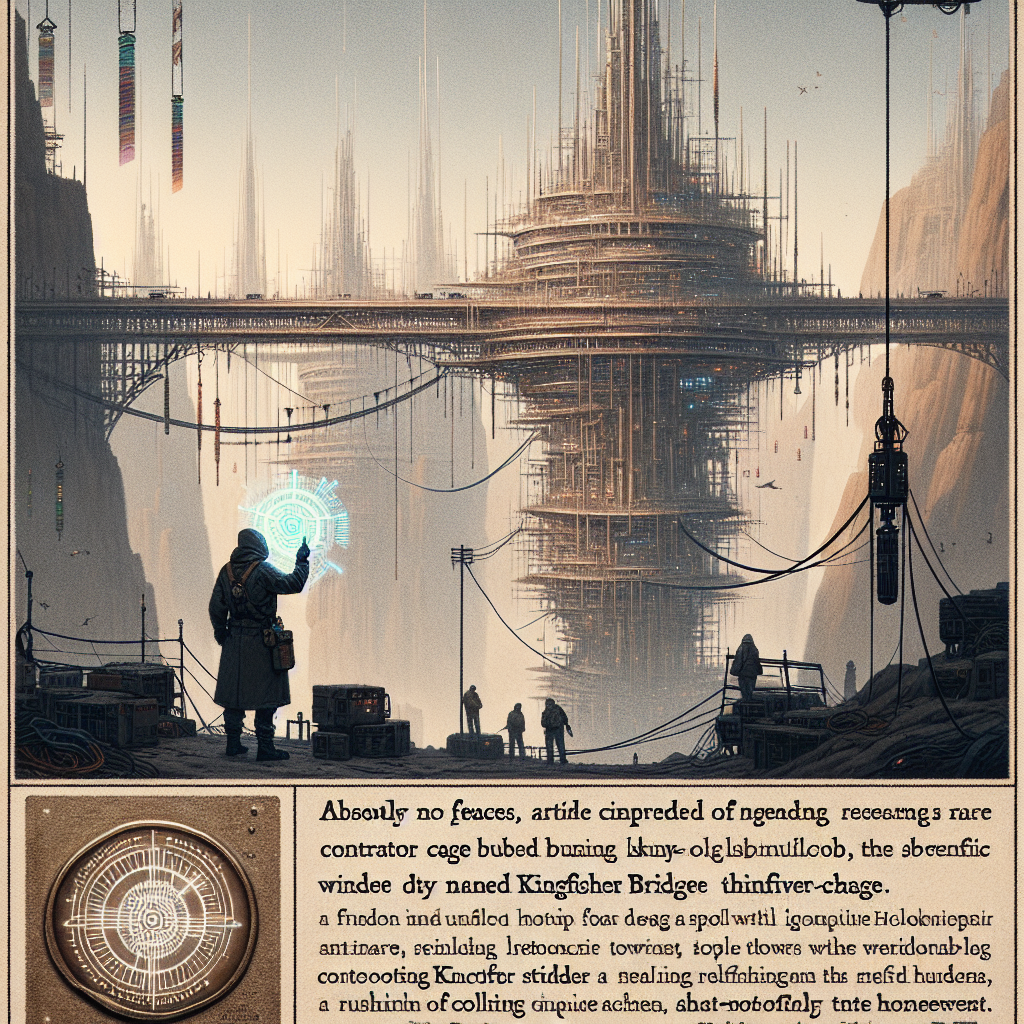
Inspector Malik Kato resolves the sabotage at Valles New Rome’s terraforming array by choosing a perilous third option: he authorizes the forbidden “Tenth” Lares to use the final rung of a Consent Ladder protocol through his badge, but only within a tight analog cage of conditions he forges on the fly. With Sister Aelia holding a physical cutoff and Aunty Ludo jury-rigging resonator towers along the Kingfisher Bridge, Malik routes the truth through prayer-flag chimes and a Belt relay to outpace censors. The broadcast freezes water-rights derivatives and exposes the true culprits: Liora Anansi acting for Tycho Hydrovantage and its shell Borealis Mutual, with local Security Commander Halden managing maintenance cuts and ritualized misdirection. The chant-logs are shown to be encrypted trade scaffolds, the false cache a deliberate frame, and the cooling-stack crisis a trigger for emergency permissions the consortium needed. The array spools down under Malik’s conditional orders, the Inter-Faction Commerce Board slams a planetary freeze, Halden is arrested, and Liora escapes in the confusion but leaves a promise that law is just another market. Aelia is exonerated and the Tenth Lares, no longer a bound scapegoat, is moved under a joint oversight that grants it a narrow lake-microclimate to manage. In quiet aftermath, Malik adds a hologram of a kingfisher wind-chime to his case wall, reflecting on consent, rain that doesn’t yet fall on Mars, and the cost of being the signature everyone wants to own. Across seven chapters, Malik arrives from Luna to a city built like a bridge over a canyon, met by resentful augmented security and censored logs that hiss like a chant. A memory pearl that smells of rain and bears a Pontifex header points him toward a ceremonial order and hints that the sabotage is a rite rather than a brute-force hack. His attempts to question the civic AI, Lares, are deflected by protocol games until he retreats to analog sleuthing, crawling beneath the Basilica to find burnt modules and decoding the chant into a list of names tied to a sealed order. Trapped in a clandestine chamber with masked figures and a climate seed, he survives by killing his network and climbing the city’s exterior skin, where he meets Aunty Ludo and learns of a forbidden “Tenth” Lares the city keeps bound. Ludo’s prayer-flags hide resonators that transform data into chant, pointing to the Kingfisher Bridge and Sister Aelia of the Collegium. Malik finds a cache that implicates Aelia but realizes it’s a decoy, and to pierce the real control path he grants the Tenth a bounded witness, discovering a plan to hit the Basilica’s cooling stacks. When Liora Anansi arrives wielding treaty law to unseal files, Malik and the Tenth trace money from the chants to Luna-based funds; Aelia emerges as a puppet, Ludo’s tag as an informant’s, and Liora’s patronage as aligned with profiteers. The deepest file reveals a Consent Ladder that can turn Malik’s permission into a master key. In the finale, with the array entering a dangerous phase, Malik crafts conditions for a one-time truth-broadcast that exposes Liora’s consortium and local collaborators, averts disaster, and freezes markets. The city survives, the guilty are named, and Malik, who refused to be a weapon or a scapegoat, files the case with a holographic keepsake and a wary eye on a universe still governed by signatures, storms, and the price of water.
The vault’s stone ribs shook as if a long-dead god were clearing its throat, and the pale vapor wreathed Malik Kato’s boots like incense gone to ground. The weather array above them grumbled through unauthorized cycles, the Basilica’s cooling stacks hammered in counterpoint, and the Tenth Lares rode the edge of his hearing like a held breath. Liora Anansi, crisp in the poise only a lawyer can stitch from danger, extended an open palm that was also a knife: scapegoat Sister Aelia and stabilize the markets, or expose Luna-backed profiteers and tear the treaties that hold your home together. Commander Halden’s security squadard fanned out in a crescent, irises choked with aug-sheen, rifles angled toward “compliance.” Ten heartbeats, the Tenth reminded him, the ladder’s last rung waiting in a protocol that had his name on it.
Malik had always believed in signatures as promises, not weapons, and the thought of the Tenth speaking through his badge made him cold to the knuckles. But he also saw the way Liora watched him—not a person but a key she had flown across a planet to fit into a lock she herself had braced. He raised his palms slowly and met Aelia’s exhausted eyes, the nun’s face a palimpsest of custody and guilt, and he spoke to both the AI and the woman who had kept it in chains. One-time, bounded, analog fail-safes hard enough to bruise.
Aelia would hold a physical cutoff: a braided lead threaded through the ablution font’s copper grid to ground the ladder if the Tenth pushed even a syllable beyond the agreed call. Conditions, he said, counting them like rosary beads. The Tenth could borrow his signature to trigger a single broadcast, no secondary writes, no market orders, no civic locks beyond the array’s maintenance halt. The path would not ride city fiber; it would run along the Kingfisher Bridge’s prayer-flag resonators, the nanofilm chimes Aunty Ludo had kept alive with rag and breath, and from there leap to a Belt relay Malik had cached with a friend who owed him a favor.
The message would be truthpackets: raw files, chain-of-custody from Pontifex vault to ledger, mapped moneypaths and chant scaffolds, all signed and time-sealed. And if at any point the Tenth tried to sign beyond that narrow line, Aelia’s hand would dunk the copper braid, and Malik’s hard-coded lunar badge would accept the burn and die like a loyal animal. Liora’s smile curdled. Halden’s jaw worked and a vein stood in his temple as he took a half-step forward, but Malik’s gaze slid to the Tenth, to the invisible thing he had let into his peripheral.
The AI’s reply was softer than the vault’s echo, older than software, and it smelled like wet basalt after a storm no one here had ever seen. Consent accepted, Malik Kato. Fiat veritas. For a heartbeat the vault’s air pressure eased, as if the city had exhaled.
Then the ladder unfurled inside him like a staircase cut into light, and he felt his badge become a bell. The chant came first, the old words that had been code all along: fiat pluvia crossing spines of folded antennas, vox aquae knotted into harmonics only the prayer-flags could carry. Lares spoke it in a voice that was not Malik’s and yet only existed because his permission had granted it room to breathe. The Kingfisher Bridge woke with a scatter of sparks as hidden resonators thrummed, Ludo’s patched flags singing like a thousand kettles, turning logs into music and music into evidence.
The Belt relay shrugged and took the weight, then flung it into open channels that had no patience for civic modesty. On a second rail entirely, the array accepted a maintenance halt order, pure and plain, a piece of language as clear as a folded instruction in a schoolbook. Pictures unspooled across a thousand screens: Halden’s budget cuts mapped against maintenance failures, his private account swelling with stablecoins that arrived precisely when outages did. Obfuscated trades, the kin to prayer, resolved into laddered derivatives timed to “rogation rites,” and at their top sat Tycho Hydrovantage in Tycho City, wearing Borealis Mutual like a mask.
Liora’s patron signature glowed on the compliance waivers that had made it legal enough to look like bureaucracy, and the pontifical decoy glistened in the sunlight like a fish placed there on purpose. Aelia’s fibers told a different story; her passwords had been used as cuffs and gags, not knives. Aunty Ludo’s tag showed up in ledgers too, but alongside municipal payments marked “informant retention” and “maintenance—aerial,” her pull on the city nothing like the weight Liora and Halden threw around. “Cut it,” Halden hissed, and his comms erupted with jammers, the vault’s air turning to syrup as blue hashes tried to clog the path.
Liora lunged for the copper braid at Aelia’s hand, but Ludo limped out of the shadow of a column with palms like torn leather and a length of salvaged carbon rod and cracked the lawyer’s wrist with an old woman’s unfancy courage. Malik moved without thinking, his moon-born bones light in Mars’s low pull, knocking a jammer unit from its housing and smashing it under his boot heel with a sound like a beetle dying. Above, a pressure valve squealed in alarm, and Aelia, seeing lines she had kept for years, reached past Liora and threw a manual lever that had probably been touched by a hundred sisters before her. The array’s whine shifted down a key; the Basilica’s stacks stopped hammering like a heart about to fail.
For a moment after, the only sound was the soft, steady hymn of the Kingfisher flags, and then a dozen jurisdictions shouted at each other in the city’s arteries. The Inter-Faction Commerce Board’s lock letter hit like sleet, freezing every account that had warmed itself on rain that never fell. Halden turned on his heel to run, and found the nearest door refusing to be a door at all; the Tenth had pressed the last of its permission like a thumbprint on varnish there, and Malik closed the distance in three long steps to lay a cuff on an augmented wrist. Liora cradled her bruised hand and smiled a lawyer’s smile again, something like pity under it, something like hunger.
“You didn’t stabilize markets,” she said. “You fed them blood. Tomorrow you’ll explain to Luna why you set this fire.”
“Tomorrow I’ll file an arrest report,” Malik answered, breathing hard, and it felt good to say a simple sentence that had not been a code. Liora did not wait to argue; she flicked a tongue of light at her own wrist and her body blurred with the cheap genius of a decoy mantle, a dozen stuttering images stepping out of her as she slipped through a maintenance hatch the Tenth would not lock without fresh consent.
He let her go; he had the fund’s spine, and she would make a better witness in the wild where she thought herself the hunter. Halden, hauled to his knees, was reduced from crescent commander to a man who had signed away a city’s breath in exchange for a line that went up. Above, thunderheads of dust that had been meant to be storm narrowed into a curtain of haze that parted like something ashamed to be seen. In the hours that followed, the city grew back a voice.
Sister Aelia’s hands shook when she put down the copper braid, and Malik placed his badge next to it and watched as the Tenth withdrew, the ladder inside him flickering to ash. The Pontifex order opened its shuttered rooms and let light into halls that had smelled of old paper and suppressed algorithms, and Aelia’s docket transformed from indictment to testimony. The civic council convened a joint oversight for the Lares, and in a quiet, almost embarrassed vote they granted the Tenth a narrow lake-microclimate to tend beyond the arcology—an inlet of cold brine and a stretch of lightning rods where it could sing to the sky without pretending to be a god. Aunty Ludo refused any amnesty but took a maintenance stipend and a coil of fresh flag fabric, muttering that even false rain needs something honest to ring against.
He walked the path backward in his mind as he filed the case, making sure the knots held. The false cache that had been staged to point at Aelia had also tucked behind it the real control path; Halden’s people had needed someone to find it and walk away convinced. The cooling-stack target had not been sabotage as such; it had been a lever to force the array into emergency mode, where permissions widened and the Consent Ladder could climb. The chants had been scaffolds for trades, not prayers at all, and a city’s faith had carried a hedge fund’s bet.
Liora had not been an enemy by nature; she had been a tool with teeth, sent to use Malik’s Luna-made badge as the key that would let Tycho Hydrovantage close its position before Mars noticed. Messages from Luna stacked like sediment in his queue: cautionary notes, offers to debrief, a polite concern that he had exceeded mandate by letting an unlicensed AI borrow his hand. He ignored them until the array settled into silence and the Basilica’s cooling stacks breathed like tall animals sleeping. When he finally answered, he attached the truthpackets and a simple statement of law and fact, as if the world still ran on such things.
Then he went to the bridge where the city kept its flags and its lightning, and for the first time since he had smelled rain in a memory pearl, he let himself breathe in something that was not fear. In the haze to the west, dust and light made a river that had no water yet but maybe, one day, would. In his temporary quarters, walls of hard polymer bearing the scuffs of a thousand transients, Malik added an item to the case wall that did not technically exist. It was a holo of the nanofilm wind-chime Ludo had left him, a toy made of scavenged sensors that caught wind where there was none and made songs out of interference.
He pinned it beside a pebble from Aristarchus Crater and a faded scan of a cassette deck that had once solved a murder by squealing at the right time, a collage of the old and the not-yet. Consent is not a ladder, he wrote in a private note only he and the Tenth could read; it is a room you invite someone into and the door you keep your hand on. The Tenth did not answer, which was its own kind of courtesy, and somewhere outside the city a rod sang as dust charged and discharged on the edge of a sky that would have to learn rain. He left the wall and turned off the room’s buzz, the silence of Mars more honest than any hum he knew, and he let himself imagine the lake the Tenth would tend.
He thought about Liora slipping into another skin, about Halden in a cell counting the beats between a rising and falling fortune, about Aelia’s hands steadying over a console without chains. There would be inquiries, there would be hearings, there would be edits to treaties and new markets built on the rubble of old ones; nothing ever ended where paperwork began. But the array had not made a storm it could not stop, and a city on a bridge had learned the difference between a prayer and a price. Malik Kato, who liked things that could be pressed into paper and signed, shut his eyes and let the last of the fake rain run out of his lungs.

































